小学一般现在时(详细讲解)
- 格式:ppt
- 大小:1.61 MB
- 文档页数:30
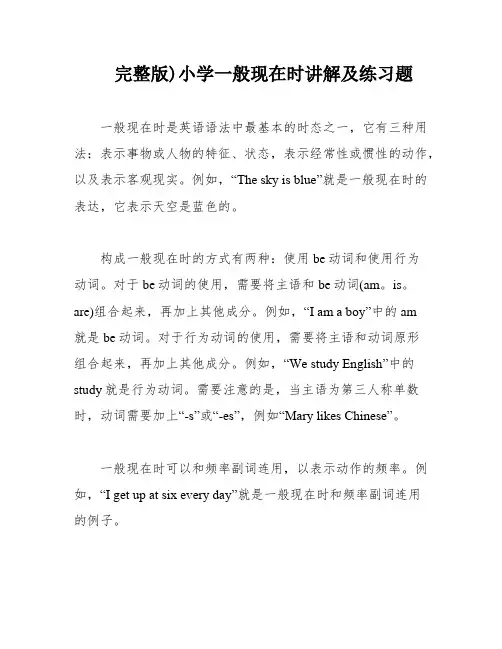
完整版)小学一般现在时讲解及练习题一般现在时是英语语法中最基本的时态之一,它有三种用法:表示事物或人物的特征、状态,表示经常性或惯性的动作,以及表示客观现实。
例如,“The sky is blue”就是一般现在时的表达,它表示天空是蓝色的。
构成一般现在时的方式有两种:使用be动词和使用行为动词。
对于be动词的使用,需要将主语和be动词(am。
is。
are)组合起来,再加上其他成分。
例如,“I am a boy”中的am就是be动词。
对于行为动词的使用,需要将主语和动词原形组合起来,再加上其他成分。
例如,“We study English”中的study就是行为动词。
需要注意的是,当主语为第三人称单数时,动词需要加上“-s”或“-es”,例如“Mary likes Chinese”。
一般现在时可以和频率副词连用,以表示动作的频率。
例如,“I get up at six every day”就是一般现在时和频率副词连用的例子。
一般现在时还可以用于构成否定句、一般疑问句和特殊疑问句。
对于be动词的否定句,需要在be动词后面加上not。
例如,“He is not a worker”就是be动词的否定句。
对于行为动词的否定句,需要在主语和动词原形之间加上don't或doesn't。
例如,“I don't like bread”和“He doesn't often play”就是行为动词的否定句。
对于一般疑问句,需要将be动词或do/does放在主语前面。
例如,“Are you a student?”就是一般疑问句。
对于特殊疑问句,需要在疑问词后面加上一般疑问句。
例如,“Where is my bike?”就是特殊疑问句。
需要注意的是,当主语为第三人称单数时,否定句和一般疑问句需要用doesn't,而不是don't或do。
例如,“He doesn't often play”和“Does she go to work by bike?”就是主语为第三人称单数时的否定句和一般疑问句。
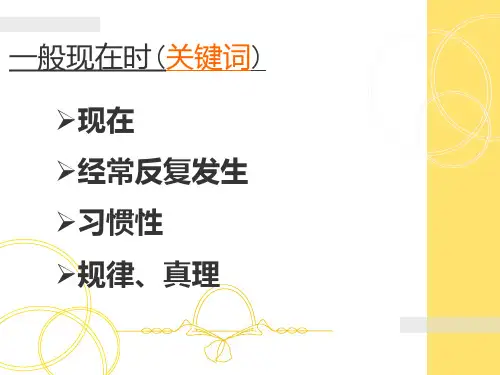
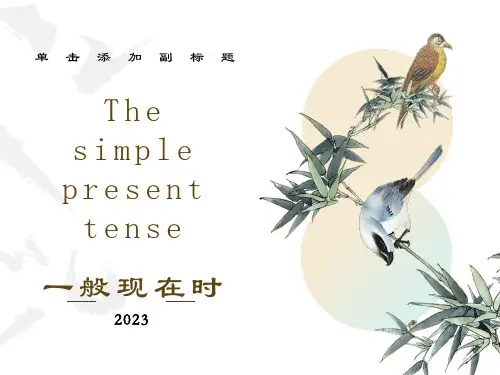

小学四年级重要知识总结一般现在时的用法一、简介在学习英语的过程中,掌握好动词的时态是非常关键的。
而一般现在时(Simple Present Tense)是英语中最基础、最常用的时态之一。
本文将总结小学四年级学生需要掌握的一般现在时的用法。
二、一般现在时的定义一般现在时用于表达习惯、经常性动作、客观事实和现在的状态等。
通常与时间副词短语(例如:always、often、sometimes)连用,能够准确地描述现阶段的事件和事物。
三、一般现在时的肯定句结构在一般现在时的肯定句中,我们使用动词的原形(即动词的原始形式,例如:play、go)来表示动作或状态。
1. 对于第三人称单数(He/She/It)的主语,动词需要加上"-s"或"-es"结尾。
例如:- He plays football every day.(他每天踢足球。
)- She eats an apple for breakfast.(她早餐吃一个苹果。
)- The cat sleeps on the sofa.(这只猫在沙发上睡觉。
)2. 对于其他主语,直接使用动词的原形即可。
例如:- I like ice cream.(我喜欢冰淇淋。
)- We go to school by bus.(我们坐公交车上学。
)- They study English on weekends.(他们周末学英语。
)四、一般现在时的否定句结构在一般现在时的否定句中,我们在助动词"Do/Does"后面加上"not",并使用动词的原形来表示否定的动作或状态。
1. 对于第三人称单数(He/She/It)的主语,助动词"Do"变为"Does",动词不再需要变化。
例如:- He does not play football every day.(他不每天踢足球。
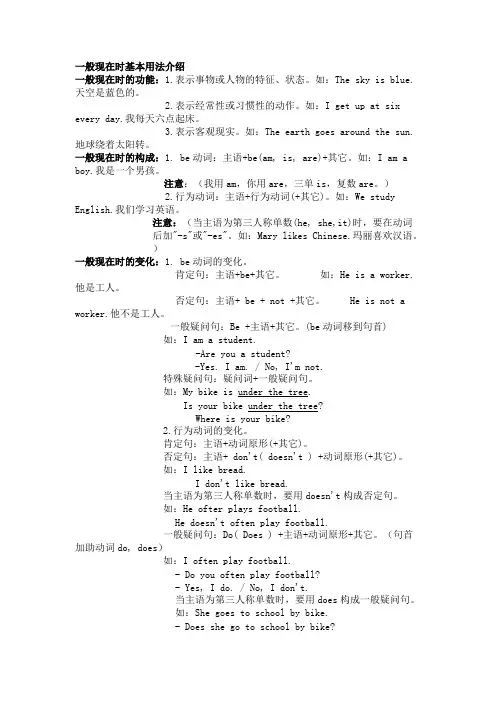
一般现在时基本用法介绍一般现在时的功能:1.表示事物或人物的特征、状态。
如:The sky is blue.天空是蓝色的。
2.表示经常性或习惯性的动作。
如:I get up at six every day.我每天六点起床。
3.表示客观现实。
如:The earth goes around the sun.地球绕着太阳转。
一般现在时的构成:1. be动词:主语+be(am, is, are)+其它。
如:I am a boy.我是一个男孩。
注意:(我用am,你用are,三单is,复数are。
) 2.行为动词:主语+行为动词(+其它)。
如:We study English.我们学习英语。
注意:(当主语为第三人称单数(he, she,it)时,要在动词后加"-s"或"-es"。
如:Mary likes Chinese.玛丽喜欢汉语。
)一般现在时的变化:1. be动词的变化。
肯定句:主语+be+其它。
如:He is a worker. 他是工人。
否定句:主语+ be + not +其它。
He is not a worker.他不是工人。
一般疑问句:Be +主语+其它。
(be动词移到句首)如:I am a student.-Are you a student? -Yes. I am. / No, I'm not.特殊疑问句:疑问词+一般疑问句。
如:My bike is under the tree.Is your bike under the tree?Where is your bike?2.行为动词的变化。
肯定句:主语+动词原形(+其它)。
否定句:主语+ don't( doesn't ) +动词原形(+其它)。
如:I like bread. I don't like bread.当主语为第三人称单数时,要用doesn't构成否定句。
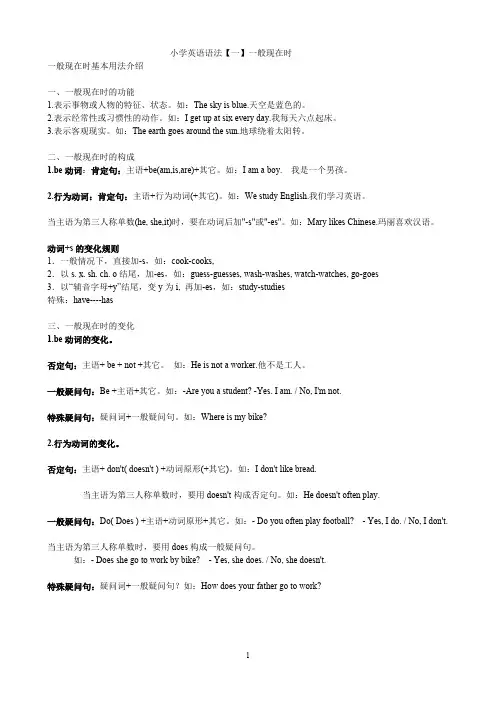
小学英语语法【一】一般现在时一般现在时基本用法介绍一、一般现在时的功能1.表示事物或人物的特征、状态。
如:The sky is blue.天空是蓝色的。
2.表示经常性或习惯性的动作。
如:I get up at six every day.我每天六点起床。
3.表示客观现实。
如:The earth goes around the sun.地球绕着太阳转。
二、一般现在时的构成1.be动词:肯定句:主语+be(am,is,are)+其它。
如:I am a boy. 我是一个男孩。
2.行为动词:肯定句:主语+行为动词(+其它)。
如:We study English.我们学习英语。
当主语为第三人称单数(he, she,it)时,要在动词后加"-s"或"-es"。
如:Mary likes Chinese.玛丽喜欢汉语。
动词+s的变化规则1.一般情况下,直接加-s,如:cook-cooks,2.以s. x. sh. ch. o结尾,加-es,如:guess-guesses, wash-washes, watch-watches, go-goes3.以“辅音字母+y”结尾,变y为i, 再加-es,如:study-studies特殊:have----has三、一般现在时的变化1.be动词的变化。
否定句:主语+ be + not +其它。
如:He is not a worker.他不是工人。
一般疑问句:Be +主语+其它。
如:-Are you a student? -Yes. I am. / No, I'm not.特殊疑问句:疑问词+一般疑问句。
如:Where is my bike?2.行为动词的变化。
否定句:主语+ don't( doesn't ) +动词原形(+其它)。
如:I don't like bread. 当主语为第三人称单数时,要用doesn't构成否定句。
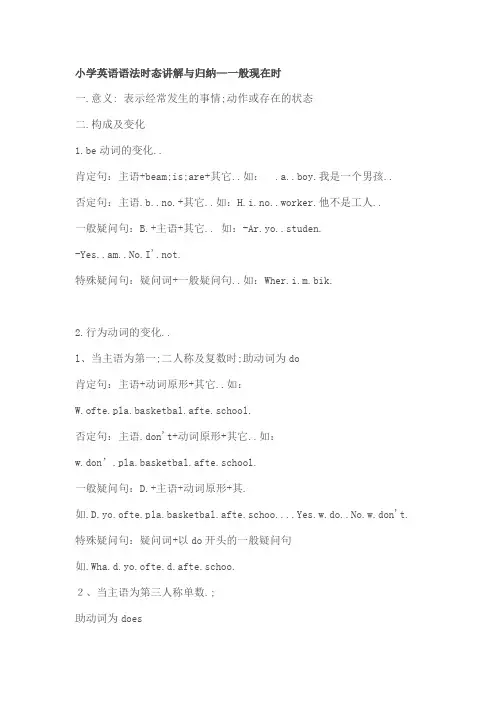
小学英语语法时态讲解与归纳—一般现在时一.意义: 表示经常发生的事情;动作或存在的状态二.构成及变化1.be动词的变化..肯定句:主语+beam;is;are+其它..如:.a..boy.我是一个男孩..否定句:主语.b..no.+其它..如:H.i.no..worker.他不是工人..一般疑问句:B.+主语+其它.. 如:-Ar.yo..studen.-Yes..am..No.I'.not.特殊疑问句:疑问词+一般疑问句..如:Wher.i.m.bik.2.行为动词的变化..l、当主语为第一;二人称及复数时;助动词为do肯定句:主语+动词原形+其它..如:W.ofte.pla.basketbal.afte.school.否定句:主语.don't+动词原形+其它..如:w.don’.pla.basketbal.afte.school.一般疑问句:D.+主语+动词原形+其.如.D.yo.ofte.pla.basketbal.afte.schoo....Yes.w.do..No.w.don't. 特殊疑问句:疑问词+以do开头的一般疑问句如.Wha.d.yo.ofte.d.afte.schoo.2、当主语为第三人称单数.;助动词为does肯定句:主语+动词三单式+其它..如.H.swim.well.否定句:主语.doesn’t+动词原形+其它..如:H.doesn’.swi.well..一般疑问句:Doe.+主语+动词原形+其它..如:Doe.h.swi.wel.Yes.h.does..No.h.doesn't.特殊疑问句:疑问词+以does开头的一般疑问句如.Ho.doe.you.fathe.g.t.wor.三.第三人称单数的动词变化规则只有在第三人称为主语的肯定句中;动词才用三单式1多数动词直接加s:runs gets likes collets takes playsclimbs…….2结尾是s.x.sh.ch.o;前为辅音字母;结尾加e.: watches teaches goes does washes crosses mixes brushes3动词末尾y前为辅音:将y改为i加es.study→studie.fly→flies carry→carriescry→cries但在y前如果为元音则直接加s: buys says四.时间标志:uall..ofte..sometime.;every…一般现在时练习题1I.用下列单词的适当形式填空1.We often___________play in the playground.2.He _________get up at six o’clock.3.__________you _________brush your teeth every morning4.What________________do he usually________________do after school5.Danny ________________study English; Chinese; maths; science and Art at school.6.Mike sometimes __________go to the park with his sister.7.At eight at night; she __________watch TV with his parents.8.________ Mike________read English every day9.How many lessons_________your classmates________have on Monday10.What time_________his mother_________do the houseworkII.改句子1.Do you often play football after school 改为肯定句2.I have many books.改为否定句3.Gao S han’s sister likes playing table tennis 改为否定句4.She lives in a small town near New York.改为一般疑问句5.I watch TV every day.改为一般疑问句6.We have four lessons.改为否定句7.Nancy doesn’t run fast 改为肯定句8.M.do.run.fast.................................否定句: 一般疑问句:9.Mike has two letters for him.一般疑问句:否定句: 10.I usually play football on Friday afternoon.否定句:一般疑问句:划线提问11.Su Yang usually washes some clothes on Saturday.否定句:一般疑问句:划线提问:12.Mingming usually waters the flowers every day.否定句:一般疑问句:13.Tom does his homework at home.否定句:一般疑问句:一般现在时练习题2一、用所给动词的真确形式填空1.. lik.___________.swim.2.H._________rea.Englis. ever. day.3.W._________got.schoo.a.seve.i.th.morning.4.Mike________got.schoo.a.seve.i.th.morning.5.M. mother________lik.______g.shopping.6..ca.________dra. man. beautifu. pictures.7.She_________mak.. mode. plane.8.D. yo.________like_________ru.9.Doe. he_________like_________jum.10.Doe.Nancy_________growflower.o.Saturda.11.Th. teachers________like___________dance.12.Th.teacher________like____________dance.13.Th.students___________spea.Englis.i.class.14.Th.student_________spea.Chines.afte.class.15.Let’s____________an.pla.footbal.. g.16.He____________.lik.swimmin.. no.17.I’.sorr.____________tha.. hea.18.Wan.Bin.is___________. writ. a.E-mai.t.hi.frien..19.H.has_____________.headach.. ge.20._________yo.stud.Englis.a.schoo..Ye..I___________. d.21.__________you.siste.stud.Englis.a.schoo..N..she_________.. d.22.I’.________.bette.. fee.23.Why__________To.absen.toda.. b.二、用所给的人称改写句子1..tak.photo.o.Sunday. Mike2.W.gro.beautifu.flowers.she3.The.lik.collectin.stamps.Ben4..liste.t.musi.carefully.m.aunt5.Yo.lik.makin..mode.ship.Helen6.W.clea.th.classroo.ever.day.he7.The.loo.afte.th.pandas.M.Wang8..dra..tre.an.som.flowers.Nancy9.W.g.t.be.a.eight. m.sister10..rea.newspaper.i.th.evening.M.Green。
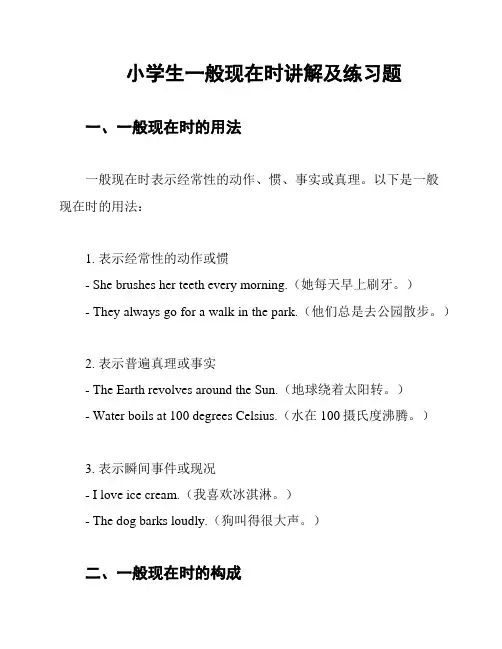
小学生一般现在时讲解及练习题一、一般现在时的用法一般现在时表示经常性的动作、惯、事实或真理。
以下是一般现在时的用法:1. 表示经常性的动作或惯- She brushes her teeth every morning.(她每天早上刷牙。
)- They always go for a walk in the park.(他们总是去公园散步。
)2. 表示普遍真理或事实- The Earth revolves around the Sun.(地球绕着太阳转。
)- Water boils at 100 degrees Celsius.(水在100摄氏度沸腾。
)3. 表示瞬间事件或现况- I love ice cream.(我喜欢冰淇淋。
)- The dog barks loudly.(狗叫得很大声。
)二、一般现在时的构成在一般现在时中,动词的变化相对简单。
1. 对于第三人称单数(He/She/It),动词要加-s或-es。
- He walks to school every day.(他每天走路去学校。
)- She eats an apple.(她吃一个苹果。
)- It runs fast.(它跑得很快。
)2. 对于其他人称(I/You/We/They),动词不变。
- I play soccer on weekends.(我周末踢足球。
)- You read books every night.(你每晚读书。
)- We go swimming in summer.(我们夏天去游泳。
)- They watch movies together.(他们一起看电影。
)三、练题请根据句意填入正确的动词形式。
1. My mother __________ (cook) dinner for us every evening.2. Tom and Lisa __________ (play) tennis on Saturdays.3. The sun __________ (rise) in the east.4. We __________ (study) English at school.5. Dogs __________ (bark) when they see strangers.1. cooks2. play3. rises4. study5. bark希望以上讲解和练习题对你有帮助!。
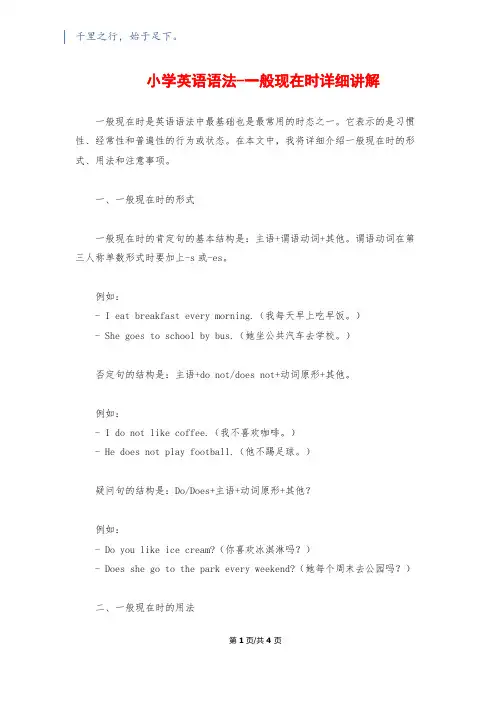
小学英语语法-一般现在时详细讲解一般现在时是英语语法中最基础也是最常用的时态之一。
它表示的是习惯性、经常性和普遍性的行为或状态。
在本文中,我将详细介绍一般现在时的形式、用法和注意事项。
一、一般现在时的形式一般现在时的肯定句的基本结构是:主语+谓语动词+其他。
谓语动词在第三人称单数形式时要加上-s或-es。
例如:- I eat breakfast every morning.(我每天早上吃早饭。
)- She goes to school by bus.(她坐公共汽车去学校。
)否定句的结构是:主语+do not/does not+动词原形+其他。
例如:- I do not like coffee.(我不喜欢咖啡。
)- He does not play football.(他不踢足球。
)疑问句的结构是:Do/Does+主语+动词原形+其他?例如:- Do you like ice cream?(你喜欢冰淇淋吗?)- Does she go to the park every weekend?(她每个周末去公园吗?)二、一般现在时的用法第1页/共4页1. 表示习惯或经常性的动作:- I write in my diary every night.(我每天晚上写日记。
)- They play basketball every Sunday.(他们每个星期天打篮球。
)2. 表示客观事实、自然规律或科学真理:- Water boils at 100 degrees Celsius.(水在100摄氏度时煮沸。
)- The sun rises in the east.(太阳从东方升起。
)3. 表示感觉、想法和喜好:- I love chocolate.(我喜欢巧克力。
)- He hates to wake up early.(他讨厌早起。
)4. 表示现时状态或现时临时的动作:- I am a student.(我是一个学生。
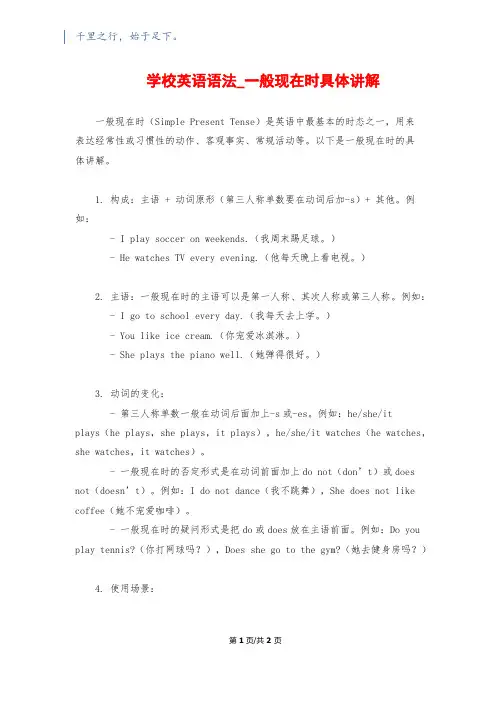
千里之行,始于足下。
学校英语语法_一般现在时具体讲解一般现在时(Simple Present Tense)是英语中最基本的时态之一,用来表达经常性或习惯性的动作、客观事实、常规活动等。
以下是一般现在时的具体讲解。
1. 构成:主语 + 动词原形(第三人称单数要在动词后加-s)+ 其他。
例如:- I play soccer on weekends.(我周末踢足球。
)- He watches TV every evening.(他每天晚上看电视。
)2. 主语:一般现在时的主语可以是第一人称、其次人称或第三人称。
例如:- I go to school every day.(我每天去上学。
)- You like ice cream.(你宠爱冰淇淋。
)- She plays the piano well.(她弹得很好。
)3. 动词的变化:- 第三人称单数一般在动词后面加上-s或-es。
例如:he/she/itplays(he plays,she plays,it plays),he/she/it watches(he watches,she watches,it watches)。
- 一般现在时的否定形式是在动词前面加上do not(don’t)或does not(doesn’t)。
例如:I do not dance(我不跳舞),She does not like coffee(她不宠爱咖啡)。
- 一般现在时的疑问形式是把do或does放在主语前面。
例如:Do you play tennis?(你打网球吗?),Does she go to the gym?(她去健身房吗?)4. 使用场景:第1页/共2页锲而不舍,金石可镂。
- 表达经常性或习惯性的动作。
例如:I eat breakfast every morning.(我每天早上吃早餐。
)- 表达客观事实、普遍真理等。
例如:The sun rises in the east.(太阳从东方升起。
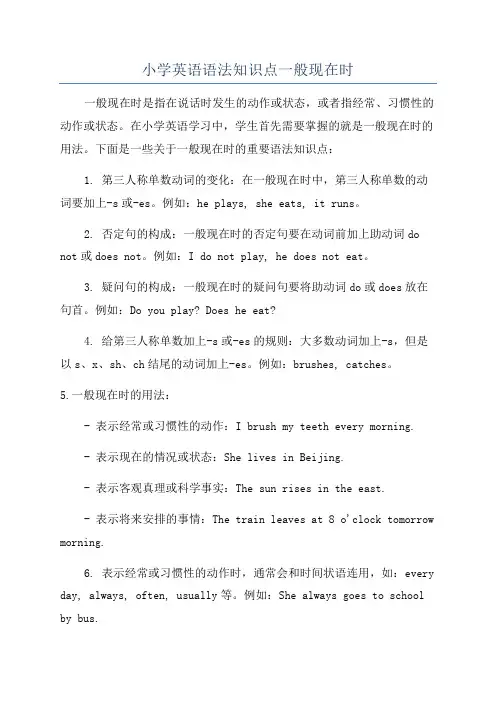
小学英语语法知识点一般现在时一般现在时是指在说话时发生的动作或状态,或者指经常、习惯性的动作或状态。
在小学英语学习中,学生首先需要掌握的就是一般现在时的用法。
下面是一些关于一般现在时的重要语法知识点:1. 第三人称单数动词的变化:在一般现在时中,第三人称单数的动词要加上-s或-es。
例如:he plays, she eats, it runs。
2. 否定句的构成:一般现在时的否定句要在动词前加上助动词do not或does not。
例如:I do not play, he does not eat。
3. 疑问句的构成:一般现在时的疑问句要将助动词do或does放在句首。
例如:Do you play? Does he eat?4. 给第三人称单数加上-s或-es的规则:大多数动词加上-s,但是以s、x、sh、ch结尾的动词加上-es。
例如:brushes, catches。
5.一般现在时的用法:- 表示经常或习惯性的动作:I brush my teeth every morning.- 表示现在的情况或状态:She lives in Beijing.- 表示客观真理或科学事实:The sun rises in the east.- 表示将来安排的事情:The train leaves at 8 o'clock tomorrow morning.6. 表示经常或习惯性的动作时,通常会和时间状语连用,如:every day, always, often, usually等。
例如:She always goes to school by bus.7. 表示现在的情况或状态时,通常与be动词连用,如:am, is, are。
例如:I am a student.8. 表示客观真理或科学事实时,通常不和时间状语连用。
例如:Water boils at 100 degrees Celsius.9.一般现在时中的一些特殊用法:- 示意要求或建议的动词(如:want, need, like, love, hate等)后接不定式,用法类似于祈使句。
小学英语一般现在时的讲解和练习一、一般现在时的构成一般现在时的构成非常简单,一般情况下,我们只需要在动词原形后面加上-s或-es 即可。
例如:I play basketball.(我打篮球。
)He studies English.(他学习英语。
)She watches TV.(她看电视。
)但是,还有一些特殊情况需要注意:如果动词以辅音字母+y结尾,将y变成i,再加上-es。
例如:study → studies, fly → flies。
如果动词以s、x、ch、sh或o结尾,加上-es。
例如:watch → watches, fix → fixes, teach → teaches。
如果动词以辅音字母+o结尾,加上-es。
例如:go → goes, do → does。
如果动词以元音字母+o结尾,加上-s。
例如:play → plays, enjoy → enjoys。
二、一般现在时的用法表示经常性的动作或习惯。
例如:I usually get up at 7 o'clock in the morning.(我通常早上7点起床。
)表示客观事实或普遍真理。
例如:The sun rises in the east.(太阳从东方升起。
)表示现在的状态或情况。
例如:He is a student.(他是一名学生。
)表示频繁或不断发生的动作或状态。
例如:She always sings when she is happy.(她开心的时候总是唱歌。
)表示说话人的观点或看法。
例如:I think English is an interesting language.(我认为英语是一门有趣的语言。
)三、一般现在时的练习选择正确的动词形式填空。
Tom _______ (like/likes) to play basketball after school.My mother _______ (cook/cooks) delicious food every day.The weather _______ (be/is) fine today.My sister _______ (read/reads) books every night before she goes to bed.The cat _______ (drink/drinks) milk every morning.答案:1) likes 2) cooks 3) is 4) reads 5) drinks用所给单词的适当形式填空。
千里之行,始于足下。
小学英语语法时态讲解与归纳一般现在时一般现在时(Simple Present Tense)是表示经常性、习惯性或普遍性的动作或状态的时态。
它用于描述我们现在经常或总是发生的动作、习惯、经验、事实和固定的真理。
下面是小学英语语法时态讲解与归纳一般现在时的内容:1. 构成一般现在时的肯定句结构为:主语 + 动词原形(第三人称单数加-s)+ 其他。
例如:- I play soccer every Saturday.(我每个星期六踢足球。
)- She eats an apple every morning.(她每天早上吃一个苹果。
)2. 第三人称单数的变化在一般现在时中,第三人称单数的动词要加上-s、-es或-ies。
例如:- She plays soccer every Saturday.(她每个星期六踢足球。
)- He eats an apple every morning.(他每天早上吃一个苹果。
)- My brother watches TV every night.(我的哥哥每天晚上看电视。
)3. 否定句和疑问句第1页/共3页锲而不舍,金石可镂。
- 否定句:在动词前加do not(don't)或does not(doesn't)。
例如:- I don't play soccer every Saturday.(我不是每个星期六踢足球。
)- She doesn't eat an apple every morning.(她不是每天早上吃一个苹果。
)- 疑问句:将助动词do(does)提到主语前。
例如:- Do you play soccer every Saturday?(你每个星期六踢足球吗?)- Does she eat an apple every morning?(她每天早上吃一个苹果吗?)4. 频率副词频率副词用来修饰动词,表示动作发生的频率。
小学英语语法时态一般现在时一般现在时(Simple Present Tense)是英语语法中最基本的一种时态,表示目前正发生的动作、存在的状态或经常性的动作。
以下是关于一般现在时的相关用法和规则。
一、动词的变化:一般现在时中,动词的第三人称单数形式(he、she、it等)需加上-s或-es。
例如:- I play football.(我踢足球。
)- She cooks dinner.(她做晚饭。
)- He watches TV.(他看电视。
)但是,以下情况除外:1. 当动词以某些字母结尾时,在动词后面直接加上-s,而不再加-es。
这些字母包括:-o(goes)、-ss(passes)、-x(fixes)、-ch(watches)、-sh(rushes)等。
例如:- She goes to school.(她去上学。
)- He passes the exam.(他通过了考试。
)2. 当动词以辅音字母+y结尾时,要将y改为i,再加-es。
例如:- He studies English.(他学习英语。
)- She tries her best.(她尽力。
)第1页/共4页3. 当动词以-e结尾时,只需加上-s。
例如:- They write letters.(他们写信。
)- He can dance.(他会跳舞。
)二、用法:1. 描述客观事实或经常性动作:一般现在时常用于描述客观事实或经常性动作。
例如:- Water boils at 100 degrees Celsius.(水沸腾的温度是100摄氏度。
)- I usually go to bed at 10 o'clock.(我通常在10点钟上床睡觉。
)2. 描述现阶段的状态:一般现在时还可用来描述现阶段的状态或对现实情况的评论。
例如:- They live in New York.(他们住在纽约。
)- She looks tired.(她看起来很累。
小学英语语法一般现在时(包括练习)一般现在时是英语中最常用的时态之一,用于表示经常性的动作、惯性的行为、客观事实以及现阶段的情况等。
在使用一般现在时时,需要注意动词的变化规则。
动词的变化规则一般现在时的动词变化规则如下:1. 对于大部分动词,其第三人称单数形式在动词末尾加上-s。
例如:go → goes,eat → eats。
2. 对于以辅音字母+y结尾的动词,将y变为i,再加上-es。
例如:study → studies,fly → flies。
3. 如果动词以-s, -sh, -ch, -x或-z结尾,直接加上-es。
例如:watch → watches,fix → fixes。
4. 对于其他动词,直接在动词末尾加上-s。
例如:play → plays,read → reads。
练题请根据句子的语境,用适当的动词形式填空。
每个空格只填一个单词。
1. Peter ___________ (like) to play basketball with his friends every weekend.2. My mother ___________ (work) as a nurse in the hospital.3. The cat ___________ (sleep) on the sofa most of the day.4. We ___________ (watch) movies at the cinema every Friday night.5. Sarah ___________ (brush) her teeth twice a day.参考答案1. Peter likes to play basketball with his friends every weekend.2. My mother works as a nurse in the hospital.3. The cat sleeps on the sofa most of the day.4. We watch movies at the cinema every Friday night.5. Sarah brushes her teeth twice a day.以上是关于小学英语语法一般现在时以及练习题的内容。
小学一般现在时讲解一、什么是一般现在时?一般现在时是用来表示现在发生的动作、惯、事实,以及经常、通常发生的动作或状态。
二、一般现在时的结构和用法一般现在时的结构为主语+谓语动词(原形)+其他成分。
常用的谓语动词有:work, go, play等。
以下是一般现在时的几种常见用法:1. 表示客观真理或普遍事实- The sun rises in the east.(太阳从东方升起。
)- Water boils at 100 degrees Celsius.(水在100摄氏度沸腾。
)2. 表示经常性的动作或惯- I usually go to bed at 10 p.m.(我通常在晚上10点睡觉。
)- He often plays soccer with his friends.(他经常和朋友们踢足球。
)3. 表示现阶段的情况或状态- She lives in New York.(她住在纽约。
)- We have two cats.(我们有两只猫。
)4. 表示固定的时间表、日程安排或时间表的安排- Class starts at 9 a.m.(课程在早上9点开始。
)- The train arrives at 8:45.(火车在8点45分到达。
)三、一般现在时的注意事项1. 第三人称单数的主语在一般现在时中的动词形式要加上-s或-es。
- She works in a hospital.(她在医院工作。
)- He brushes his teeth every morning.(他每天早上刷牙。
)2. 在否定句和疑问句中需要使用助动词do/does,并将动词改为原形。
- They don't like vegetables.(他们不喜欢蔬菜。
)- Does he play the piano?(他会弹钢琴吗?)四、小练请根据下列句子中的动词填写所缺的动词形式(原形/第三人称单数形式):1. I ___________ (study) English every day.2. Tom ___________ (go) to school by bike.3. Lucy ___________ (watch) TV in the evening.4. They ___________ (play) soccer on weekends.5. The cat ___________ (sleep) in the sun.答案:1. study2. goes3. watches4. play5. sleeps以上就是关于小学一般现在时的讲解。
英语一般现在时全面讲解附练习及答案概念1.表示经常性或习惯性的动作,常与表示频度的时间状语连用。
如:al ways, usually, often, sometimes, seldom(很少), never(决不), every day, at 8:30, on Sunday,in the morning等。
如:I always get up at 6:00 in the morning.2.表示现在时刻的状态、能力、性格、个性。
如:She loves English very much. My sister can play the piano very well.3.表示客观的事实。
如:The sun rises in the east. 太阳从东方升起。
4.格言或警句。
如:Pride goes before a fall. 骄者必败。
02句子结构1.如果句子主语的人称是I, we, you, they或复数名词时,动词用动词原形。
如:We often go home by bus.2.如果句子的主语是第三人称单数,即:he, she, it 或单数名词时,动词要用第三人称的单数形式。
如:He often goes home by bus03动词的第三人称单数构成规则1.一般情况下在动词的后面直接加“s”;如:work→works play→plays¬ rain→rains see→sees visit→visits2.以o, x,s,sh, ch结尾的动词,在后面加“es”;如:do→does fix→fixes guess→guesses wash→washes teach→teaches3.以辅音字母加y结尾的动词,先把“y”改为“i”, 再加“es”;如:fly→flies study→studies carry→carries4.不规则变化。
如:have→has04注意在一般现在时的句子中,如果前面使用了助动词does, doesn’t, will, won’t, can, can’t, would, wouldn’t, must, mustn’t 等,尽管主语是第三人称单数,后面的动词用动词原形。